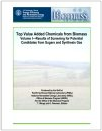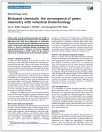What It Is:
Process Engineering encompasses the analysis, modeling, simulation, optimization, design, control and operation of process systems, from micro-sized systems to huge industrial facilities.1
How It Relates to Green Chemistry:
Many conventional industrial processes were not designed with sustainability in mind. Green process engineering hinges on the idea of process intensification. Process intensification means decreasing the size and impact of manufacturing. This includes designing industrial processes to minimize use of energy and materials and avoid hazards and pollution.
“Greening” an industrial process could include reducing the amount of equipment needed, using continuous flow reactions, or using a micro-reactor that decreases hazard.
Process Engineering is a particularly challenging area of green chemistry and engineering. The scale of industrial processes makes it difficult to update costly equipment – especially when changes could potentially impact the product quality.
-
- Prevention – Choosing analytical methods that use the minimum amount of materials prevents waste and avoids treatment or clean-up after the fact
- Reduce Derivatives – Using greener process engineering practices can lead to a reduced need for derivatives. For example, by removing the need for an intermediate using a continuous flow reactor
- Inherently Safer Chemistry for Accident Prevention – Green process engineering minimizes risk, such as by using smaller quantities of potentially harmful chemicals
- Design Systems Holistically and Using Life-Cycle Thinking – Processes should be designed with efficiency, safety, environmental impact and sustainability in mind
-
Synthesis of Rubber
A process for making 4-ADPA, a key building block for a rubber preservative, was redesigned by Flexsys (now Eastman Chemical) to replace a method that required hazardous chemicals such as aniline, formic acid, chlorine and xylene. Flexsys found a solution in a reaction that eliminates the need for large quantities toxic chlorine gas and prevents expensive, difficult-to-treat waste. The process is now used at an industrial scale. This synthesis is an example of how the right chemical process design can reduce waste, cut costs, and employ chemical synthesis methods that are safer for the environment. (PGCCA 1998)
Herbicide Production
DSIDA is a key building block for the herbicide RoundUp®. Monsanto's novel synthesis of DSIDA eliminates most of the manufacturing hazards associated with the previous synthesis; it uses no ammonia, cyanide, or formaldehyde. This synthesis is safer to operate, has a higher overall yield, and has fewer process steps. Instead of using a Raney copper catalyst in a slurry reactor, Monsanto and Dow Chemical developed a continuous fixed-bed catalyst and process that would give high conversions and long catalyst lifetime. To accomplish this, a Cu/Co/ZrO2 catalyst was developed that allowed for continuous production in a reactor system. Yields of 98% were achievable and research was published in chemical engineering journals in 2014 and 2015. (PGCCA 1996)
-
Continuous Flow Chemistry’s Role in Providing Greater Access to Medication Around the World (The Nexus, 2017)
Flow Chemistry for Sustainable Chemical Manufacturing (GC&E Presentation, 2016)
Minimizing Waste in a Mechanochemical Witting Reaction (GC&E Presentation, 2016)
-

Process Intensification for Green Chemistry (2013)
Beginning with an overview of principles and practice of process intensification, this book presents detailed definition and case studies of different “intensified” reactor types and process approaches. The text wraps up with chapters on economic and environmental considerations with respect to process intensification, and examples of industrial implementation.
Green Separation Processes: Fundamentals and Applications (2005)
This book offers and overview and examples of synthetic methodology and separation process developments. Emphasizing product separation and recovery, the thorough text describes both general principles and comprehensive discussion.
Green Chemistry: Synthesis in Micro Reactors (2003)
This review discusses the environmental benefits of equipment miniaturization, such as solvent free mixing, integrated separation techniques, and point-of-use preparation of chemicals (leading to waste reduction).


